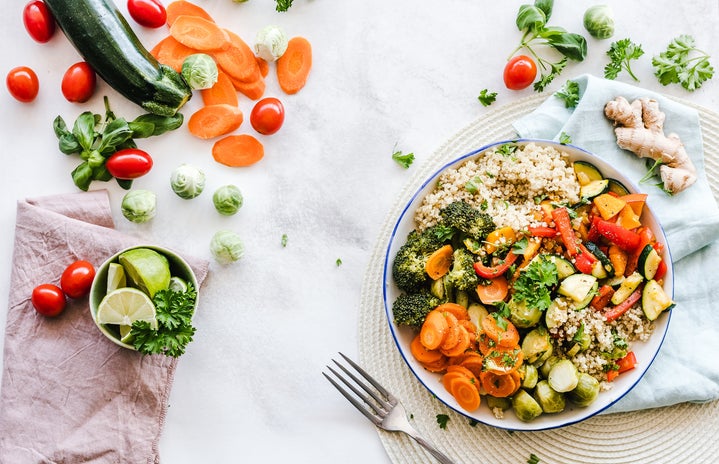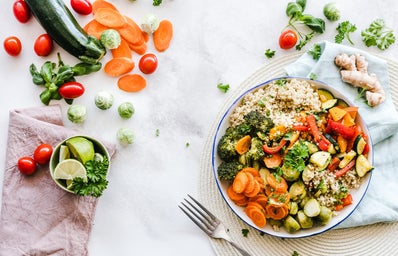As an aspiring dietitian, I’m always looking for new resources to learn about nutrition, and social media platforms such as TikTok make it quick, entertaining, and informative. Registered Dietitian Taylor Grasso is one of my biggest role models as I expand my knowledge and perspective of the field. I love her “non-diet culture” approach to achieving a healthy body and mind. I had the pleasure of interviewing her, where we discussed women’s nutrition, intuitive eating, and body acceptance. Here are some key elements of our conversation!
Basic nutrition principles to know
An essential element to consider when making food choices is how the food will make your body feel. Listen to your body! Are you full, are you energized, are you still hungry? Something Taylor stated during our conversation was that “Blood sugar balance is the foundation of a lot of nutrition principles that all people should know.” When we pair our favorite carbohydrates with protein, fat, or fiber, it slows down the release of glucose into the blood, creating a more stable source of energy (no crashing and burning!), while also supporting our hormones. As a dietitian who works with women, Taylor brought up the important point that women experience drastic hormonal shifts that men do not and that nutrition should support our hormonal needs to make us feel our best. If you’re interested in learning more, Taylor elaborates on the menstrual cycle, birth control, and cycle syncing in recent episodes of her podcast!
Becoming an intuitive Eater
During our conversation, Taylor explained to me that the popular term “Intuitive Eating” comes from the theory that “Diets may give short-term weight loss results, but they do not give long-term sustainability.” The basis of becoming an intuitive eater is to gain an understanding of hunger and fullness queues, and this ties nicely into the whole “notice how food makes you feel” thing I mentioned earlier. When you learn to understand your hunger queues, you can also learn to unconditionally permit yourself to eat when you feel hungry. And what do you eat? You eat what you want, with the addition of nutrient density to feel good and provide yourself with steady energy. Restriction is a vicious cycle, while the addition of nutrient density and understanding of your own hunger needs is gentle and sustainable. Please… let’s remove words like “good” or “bad” from the discussion of food choices and redirect our attention to what’s more important: “How does this food make me feel?” This creates consistently healthier eating habits, eliminates “yo-yo dieting,” and promotes a much happier, guilt-free relationship with food.
Social Media, nutrition, and body image
Taylor and I discussed the presence of nutritionists and health coaches on social media who sometimes spread misinformation about ingredients and promote products with minimal prior knowledge. This is incredibly harmful, considering how prevalent they are on platforms such as Instagram and TikTok. We discussed Bloom, a popular greens powder that I’m sure we’ve all heard about by now. She explained to me that Bloom is not third-party tested, meaning the ingredients on its label do not necessarily have to match the product itself. This shocked me, considering how many influencers I’ve seen advertise the product. Be careful of where you are getting your nutrition advice!
This is not the only way social media demonstrates influence on food choices. Taylor explained to me that an important step in tackling struggles with body image is a social media clean-out. Unfortunately, there is a lot of content on social media that stunts progress toward a healthy body and mind by evoking negative self-thoughts among women. I took a minute to reflect on my own social media choices and can conclude that at times I have fallen victim to negative self-talk as a by-product of online content too. Be mindful of where you spend your time on social media, and find what makes you feel uplifted!
“We don’t recognize how much consumption of social media effects our food choices, body image, and the way we view exercise. If you have individuals on your feed who are making you feel negative about yourself in any way, shape, or form… mute or unfollow”
Taylor Grasso (2024)
Notice what your body does for you
As we talked about what Taylor does for her clients to help them achieve body acceptance, she shared advice with me that I believe every woman needs to hear: “Focus on being grateful for what your body can do, rather than focusing on how your body looks.” Taylor also brought up affirmations and explained that the most realistic ones are not based on appearance, rather, they look like this: “I’m grateful for my legs because they allow me to walk my dogs, and I love being out in the sunshine” (a direct quote from the dietitian)! This was such an interesting spin on typical body positivity, and the emphasis on body function over body aesthetics was extremely refreshing. When women understand that body size and appearance do not have to be connected to nutrition, we are more consistent in eating more nutrient density and appreciating the way food makes us feel without guilt.
Conclusion
On top of the amazing nutrition science classes I take in college, I am so grateful for all the external resources I have access to as I prepare to become a dietitian. Talking with Taylor was such a wonderful experience and I highly recommend looking into her TikTok or her podcast, Simply Balanced With Taylor Grasso, for more easy, accessible information about women’s nutrition!



